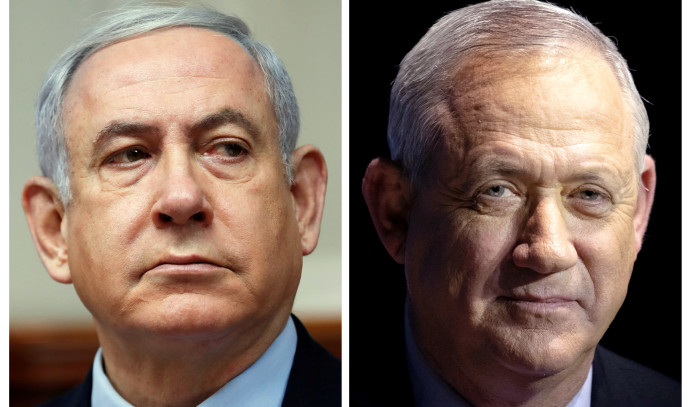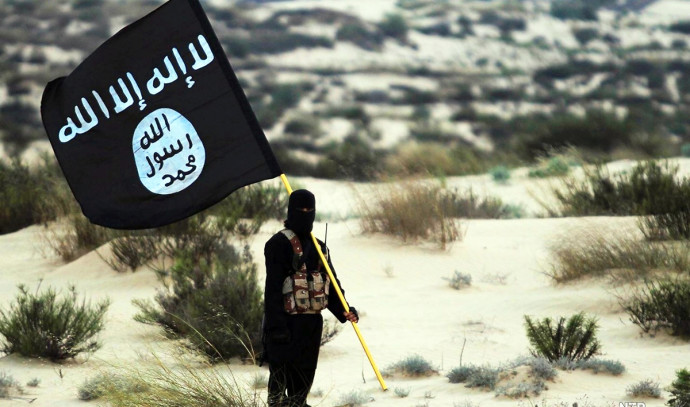Israel forms emergency gov’t for Hamas war, Gantz to join Netanyahu
An emergency government was formed on Wednesday afternoon after Prime Minister Benjamin Netanyahu and National Unity leader Benny Gantz met at the IDF headquarters in Tel Aviv earlier in the morning.
The meeting lasted half an hour after which lawyers representing the Likud and National Unity stayed behind to finalize the details.
As part of the deal, Gantz and fellow party member Gadi Eisenkot will be sworn in as ministers and will join a war cabinet with Netanyahu and Defense Minister Yoav Gallant.
There has been a widespread call for an emergency government in Israel since Netanyahu declared war on Hamas on Saturday following their massive attack on Israel that morning.
Gantz was immediately joined by opposition leader Yair Lapid and Yisrael Beyteny leader Avigdor Liberman in saying that they would be willing to join an emergency government. Coalition members also expressed support for the move.
Israeli soldiers patrol in the southern Israeli city of Sderot, October 11, 2023 (credit: FLASH90/CHAIM GOLDBERG)
Netanyahu and Gantz have held multiple meetings over the past few days to discuss the details of the emergency government, but five days in, no such thing had been formed.
One point of contention is a war cabinet suggested by Gantz that would include Netanyahu, Gallant, and two other coalition representatives together with Gantz and Eisenkot, both of whom are former IDF chiefs of staff.
Gantz’s plan would exclude Finance Minister Bezalel Smotrich and National Security Minister Itamar Ben-Gvir – a move that the latter took issue with.


Vladimir Putin has long projected friendly ties to Israel. But his silence since Saturday’s assault illustrates how the war in Ukraine has strained the relationship between the two countries.
Russian President Vladimir Putin has proposed to Wagner Group fighters that a senior mercenary named Andrey Troshev now command the private military group, according to comments the Russian leader made to the Kommersant newspaper.
Putin appears to have created a split between senior fighters from the Wagner mercenary group and its leader Yevgeny Prigozhin since its failed uprising last month – at least in terms of the narrative emerging from his comments to the Kommersant.
The paper was reporting on a meeting held by the Russian president five days after the Wagner rebellion collapsed at the end of June – a meeting attended by Prigozhin and several dozen senior Wagner combatants.
According to Kommersant, Putin told dozens of Wagner mercenaries in the meeting that among the multiple employment choices he offered to them, one included them continuing to fight under their direct commander, a man who goes by the call sign, ‘Sedoy,’ meaning ‘grey hair.’
“They could have all gathered in one place and continued to serve,” Putin said, “and nothing would have changed for them. They would be led by the same person who has been their real commander all along.”
“And what happened then?” the Kommersant reporter said in reply to Putin. “Many people nodded [affirmatively] when I said that,” Putin replied.
Sedoy is the call sign of Andrey Troshev, a retired Russian colonel and a founding member and Executive Director of the Wagner Group, according to sanctions documents published by the European Union and France.
European Union sanctions concerning the situation in Syria detail Troshev’s position as the chief of staff of the Wagner Group operations in Syria, which supported the Syrian regime.
Troshev was born in April 1953 in Leningrad, in the former Soviet Union, according to the EU sanctions from December 2021.
“Andrey Troshev is directly involved in the military operations of the Wagner Group in Syria. He was particularly involved in the area of Deir ez-Zor,” it added. “As such, he provides a crucial contribution to Bashar al-Assad’s war effort and therefore supports and benefits from the Syrian regime.”
United Kingdom sanctions from June 2022 also say “Andrey Nikolaevich Troshev was the Chief Executive of the Wagner Group. Therefore, he has supported the Syrian regime, was a member of a militia, and has repressed the civilian population in Syria.”
His associates include Wagner Group founder Dimitriy Utkin, who is also a former Russian GRU military intelligence officer, according to EU sanctions. Troshev is also associated with Wagner group commanders Aleksandr Sergeevich Kuznetsov and Andrey Bogatov.
‘Grey hair’ is also a former employee of the special rapid response detachment of the Russian Interior Ministry’s Northwestern Federal District, according to Russian online news outlet Fontanka. He is also a veteran of the wars in Chechnya and Afghanistan.
For his service in Afghanistan, Troshev was awarded two Orders of the Red Star – a Soviet Union decoration for exceptional service. For service in the operation in Chechnya, he was awarded two Orders of Courage and a medal of the Order of Merit for the Fatherland, 2nd degree, according to Russian media.
Troshev was among those invited to a reception at the Kremlin in December 2016. A photograph, believed to be from that 2016 reception, emerged in Russian media in 2017 and shows Putin alongside Troshev and Utkin, who are both wearing several medals.
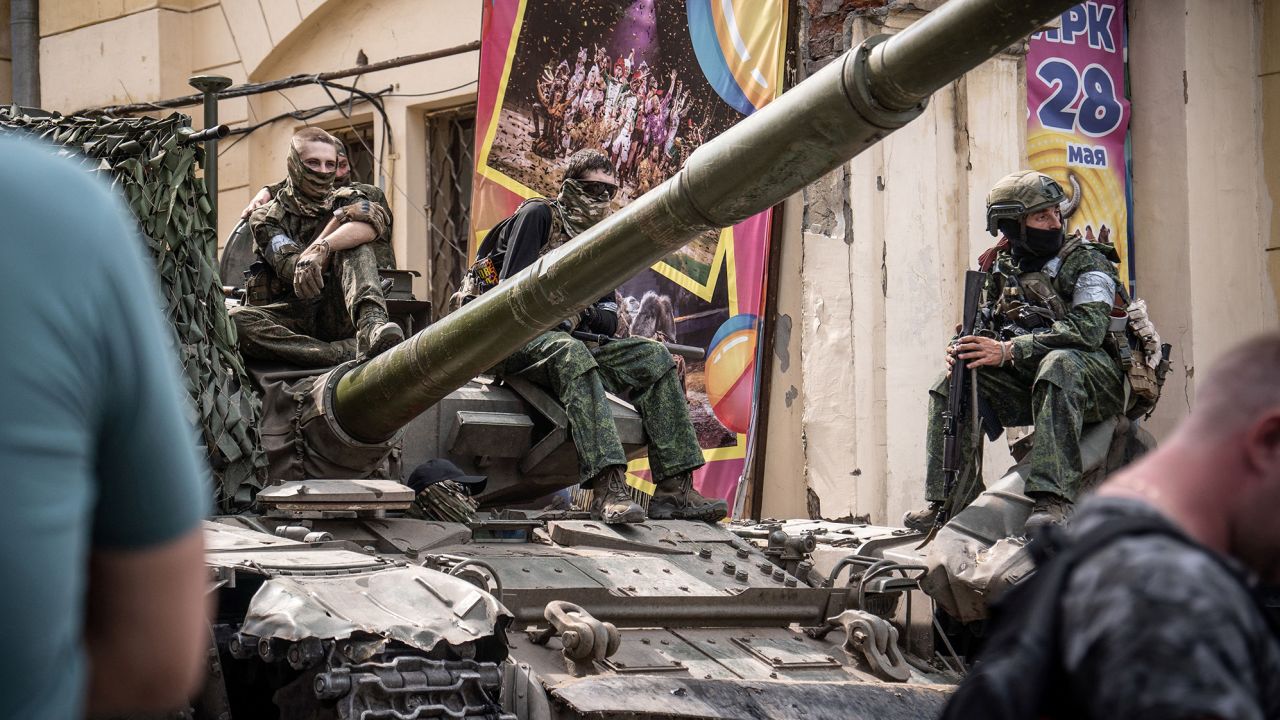
Ukraine imposed sanctions against Troshev on February 26, 2023.
Meanwhile, the fate of Wagner boss Prigozhin remains unclear. Prigozhin had reportedly traveled to Belarus as part of a deal brokered by Belarusian President Alexander Lukashenko following the failed uprising, but the Belarusian president told CNN last week the Wagner leader is now in Russia.
Footage purporting to show a police raid on Prigozhin’s premises in St. Petersburg has also raised questions about his status. Prigozhin has not been seen in public since June 2.
The Minions are back again, and this time the small yellow creatures are taking their future boss Gru on a new adventure set before the events of Despicable Me.
Both a prequel to Despicable Me and a sequel to Minions, The Rise of Gru charts the eponymous character’s quest to becoming a villain worthy of joining a team of nefarious reprobates known as the Vicious 6.
Steve Carell and Pierre Coffin once again return to their title roles in the animated film franchise, and they are joined by an A-list cast of actors.
Minions: The Rise of Gru Voice Cast: All the Stars Joining Steve Carell

A still from “Minions: The Rise of Gru” featuring Gru and Minions Bob, Stuart and Kevin. Both Steve Carell and Pierre Coffin return to voice their respective characters from the “Despicable Me” franchise. Universal Pictures
As previously mentioned, Carell and Coffin reprise their roles as Gru and the Minions, respectively, with the latter voicing quartet Kevin, Stuart, Bob and Otto in particular—but they’re not the only actors returning to the franchise.
Russell Brand reprises his role as Dr. Nefario, Gru’s future partner in crime, in the Minions sequel, while the iconic Julie Andrews has also come back to voice the villain’s mother Marlena once more.
Steve Coogan, who has voiced several characters in the Despicable Me franchise, also returns to voice Silas Ramsbottom, the director of the Anti-Villain League who appeared in the franchise’s second film.
The Vicious 6 are voiced by a number of iconic stars, with Michelle Yeoh playing member Master Chow, Jean-Claude Van Damme voicing the aptly named Jean Clawed, Dolph Lundgren lending his voice to Svengeance, and Taraji P. Henson voicing the group’s new leader Belle Bottom.
The villainous team is completed by Danny Trejo as Stronghold, Lucy Lawless as Nunchuck, and Alan Arkin as the Vicious 6’s former leader Wild Knuckles.
Other notable actors voicing characters in the kids film include comedians Will Arnett and Jimmy O. Yang, and Futurama star John DiMaggio.
Here is the Full Voice Cast for ‘Minions: The Rise of Gru’:
- Steve Carell as Gru
- Pierre Coffin as Kevin, Stuart, Bob, Otto, and the rest of the Minions
- Taraji P. Henson as Belle Bottom
- Michelle Yeoh as Master Chow
- Jean-Claude Van Damme as Jean Clawed
- Lucy Lawless as Nunchuck
- Dolph Lundgren as Svengeance
- Danny Trejo as Stronghold
- Russell Brand as Dr. Nefario
- Julie Andrews as Marlena Gru
- Alan Arkin as Wild Knuckles
- RZA as Biker
- Jimmy O. Yang as Henchman #1
- Kevin Michael Richardson as Henchman #2
- John DiMaggio as Henchman #3
- Michael Beattie as VNC Announcer and Guru Rick
- Will Arnett as Mr. Perkins
- Steve Coogan as Silas Ramsbottom
- Colette Whitaker as Gru’s Teacher
- Raymond S. Persi as Birthday Kid
Minions: The Rise of Gru will be released in theaters on Friday, July 1.

The Minions from “Minions: The Rise of Gru” which will come out in theaters on Friday, July 1. Universal Pictures
“Hamas terrorists bound, burned, and executed children,” Prime Minister Benjamin Netanyahu proclaimed in a speech Monday, condemning the perpetrators of Saturday’s terror.
“They are savages. Hamas is ISIS.”
The comparison to the notorious terrorist organization ISIS underscored the gravity of the situation and the global threat that Netanyahu believes Hamas poses. Just as the international community rallied together to combat the menace of ISIS, the prime minister implored the forces of civilization to unite once more, supporting Israel’s efforts to dismantle Hamas.
But is Hamas ISIS?
Dr. Harel Chorev of the Moshe Dayan Center for Middle Eastern Studies at Tel Aviv University said that Hamas and ISIS share ideological foundations and revere the same philosophical figures that developed them: Abdullah Azzam and Sayyid Qutb.
An ISIS member carries and Islamic State flag in Syria. (credit: NDLA)
Azzam, born in the Palestinian West Bank during the 1950s under Jordanian rule, is often regarded as pivotal in developing contemporary global jihadism. A deep-seated hatred towards Israel marked his early years, particularly intensified when his family was compelled to flee across the Jordan River following Israel’s victory in the 1967 Six-Day War.
Azzam’s writings and lectures on “al-Qaida al-Sulba” (the Firm Foundation) laid the groundwork for the emergence of the al-Qaida terrorist organization. He recruited Osama Bin Laden to run the organization.
Additionally, Azzam was a central figure in Hamas’s genesis, contributing to its founding charter’s authorship. He is best known for his reinterpretation of Islamic history and modern Western philosophy to provide ideological justifications for the fantastical ideologies driving global Islamist militant movements.
Sayyid Qutb was an Egyptian ideologue who established the theoretical basis for radical Islamism.
Centered on these philosophers’ ideologies, Hamas and ISIS subscribe to a profoundly paranoid and apocalyptic perspective, in which they propagate the belief that “Crusaders and Zionists” were conspiring for centuries to destroy Islam.
“They are running a holy war against their enemies,” explained Chorev.
However, the similarities between ISIS and Hamas are not only in philosophy but action, Chorev said. Here are four more things they have in common:
Dehumanization of non-Muslims
As per Chorev’s analysis, both ISIS and Hamas employ dehumanizing rhetoric against individuals who do not adhere to their interpretation of Islam – Christians and Jews, as well as Muslims they consider “not good Muslims.” Their vehemently anti-Western stance is interconnected with this dehumanization, as is their explicit and overt expression of antisemitism.
“You can see it in their incitement on social networking,” Chorev said, illustrating his point by referencing an incident following the tragic murder of Alter Shlomo Lederman, a 20-year-old yeshiva student who was deliberately targeted at a Ramot bus stop earlier this year. He noted that Hamas had released a cartoon depicting Lederman’s face, complete with his fur hat, portrayed as part of a Palestinian maqluba dish, with a family gathered around, consuming it.
“They see their enemies not as human enemies,” Chorev said.
Treatment of women
Both ISIS and Hamas are known to treat non-Muslim women as “sex toys,” said Chorev.
Following the recent attacks, videos circulated of the terrorists glorifying Allah for sending them “sex slaves.” Israeli actress and advocate Noa Tishby shared footage released online by Hamas in which you can see several girls paraded through Gaza’s city streets, some half-naked and others with blood gushing from between their legs.
View this post on Instagram
Similar stories have been shared by Yazidi women and girls who were abducted by ISIS and often sold into sexual slavery.
Martyrdom
Both ISIS and Hamas celebrate becoming a “shaheed” or martyr for the Islamic faith. According to Chorev, when terrorists are apprehended in Israel there are often accounts of them expressing a willingness to die or even a desire for it, sometimes sharing that, “My family would be proud of me.”
He said, “This is hard, even impossible, for a typical Westerner to understand. How could someone desire his death? But it is the great common denominator between ISIS and Hamas.”
According to Chorev, the two organizations have at least one more thing in common:
By December 2017, the ISIS caliphate had relinquished control over 95% of its territory. Then, in 2019, the final vestiges of the physical ISIS caliphate met their end when the US-backed Syrian Democratic Forces declared triumph following the Battle of Baghuz Fawqani in March 2019, effectively pushing the group into dormancy.
“ISIS was the boss for quite some time until the West decided to destroy it,” Chorev concluded. “Hamas can be destroyed, too.”
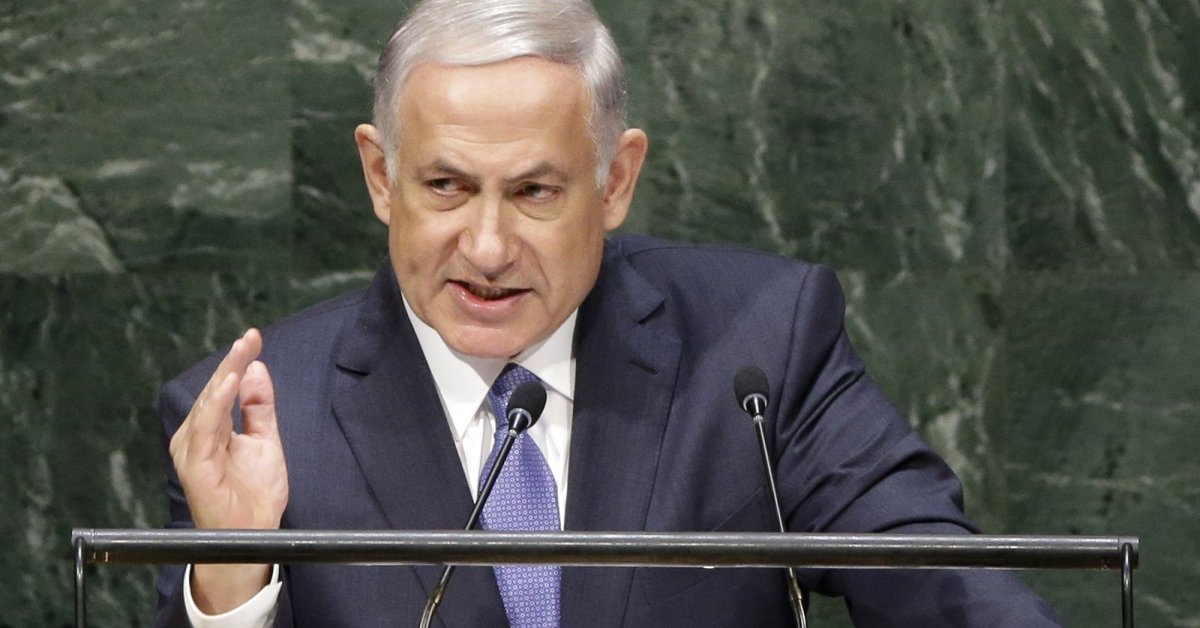
Israeli Prime Minister Benjamin Netanyahu pushed back Monday against Palestinian leader Mahmoud Abbas’ claims that Israel was waging a “genocide” against Palestinians, and called on world leaders to treat Palestinian militant group Hamas as indistinct from the Islamic State of Iraq and Greater Syria (ISIS).
Speaking at the United Nations General Assembly, Netanyahu refuted claims by Abbas and others that his military had committed war crimes during the 50-day war in the Gaza Strip this summer, citing the lengths to which the Israeli Defense Force went to warn civilians to evacuate targeted areas.
“Israel dropped fliers, made phone calls, sent text messages, broadcast warnings in Arabic, all to allow civilians to evacuate targeted areas,” Netanyahu said, arguing that Israel took all available precautions to protect civilian lives, while Hamas deliberately fired rockets from areas where children live and play. “Israel was using its missiles to protect its children, Hamas was using children to protect its missiles,” he added.
He said that the fact that Hamas’s deliberate placement of rockets in civilian communities were the “real war crimes.”
The Israeli Prime Minister also spoke about the growing “cancer” of militant Islam, comparing the situation in Israel with that in Iraq and Syria. “ISIS and Hamas are branches of the same poisonous tree,” he said. “When it comes to their ultimate goals, Hamas is ISIS and ISIS is Hamas. And what they share in common, all militant Islamists share in common.”
The conflict, which ended in August, left 2,100 Palestinians dead and 73 Israelis dead, according to the BBC. The UN said that most of the Palestinian dead were civilians. “This last war against Gaza was a series of absolute war crimes carried out before the eyes and ears of the entire world, moment by moment,” Abbas said last week.
Netanyahu said criticism in Europe of Israel’s treatment of Palestinian civilians often amounts to thinly-veiled anti-Semitism. “We hear mobs today in Europe call for the gassing of Jews, we hear some national leaders compare Israel to the Nazis,” he said. “This is not a function of Israel’s policy, this is a function of diseased minds. That disease has a name, it’s called anti-Semitism, and it’s spreading in polite society.”
The president also warned that Iran was undergoing a “manipulative charm offensive” in order to lift sanctions and continue with plans to build a nuclear weapon. “It’s one thing to confront militant Islamists on pickup trucks… its another thing to confront militant Islamists armed with weapons of mass destruction,” he said. “Would you let ISIS enrich uranium? Then you shouldn’t let the Islamic state of Iran do them either.”
A UN Council tasked with negotiating with Iran on its nuclear program has not made much progress in recent weeks, according to the LA Times. They hope to reach an agreement to limit Iran’s nuclear program to non-military uses in exchange for lifting oil sanctions.
Netanyahu urged the world’s leaders not to trust what he called the “world’s most dangerous regime.” “To say Iran doesn’t practice terrorism is like saying Derek Jeter never played shortstop for the New York Yankees,” he said.
Write to Charlotte Alter at charlotte.alter@time.com.

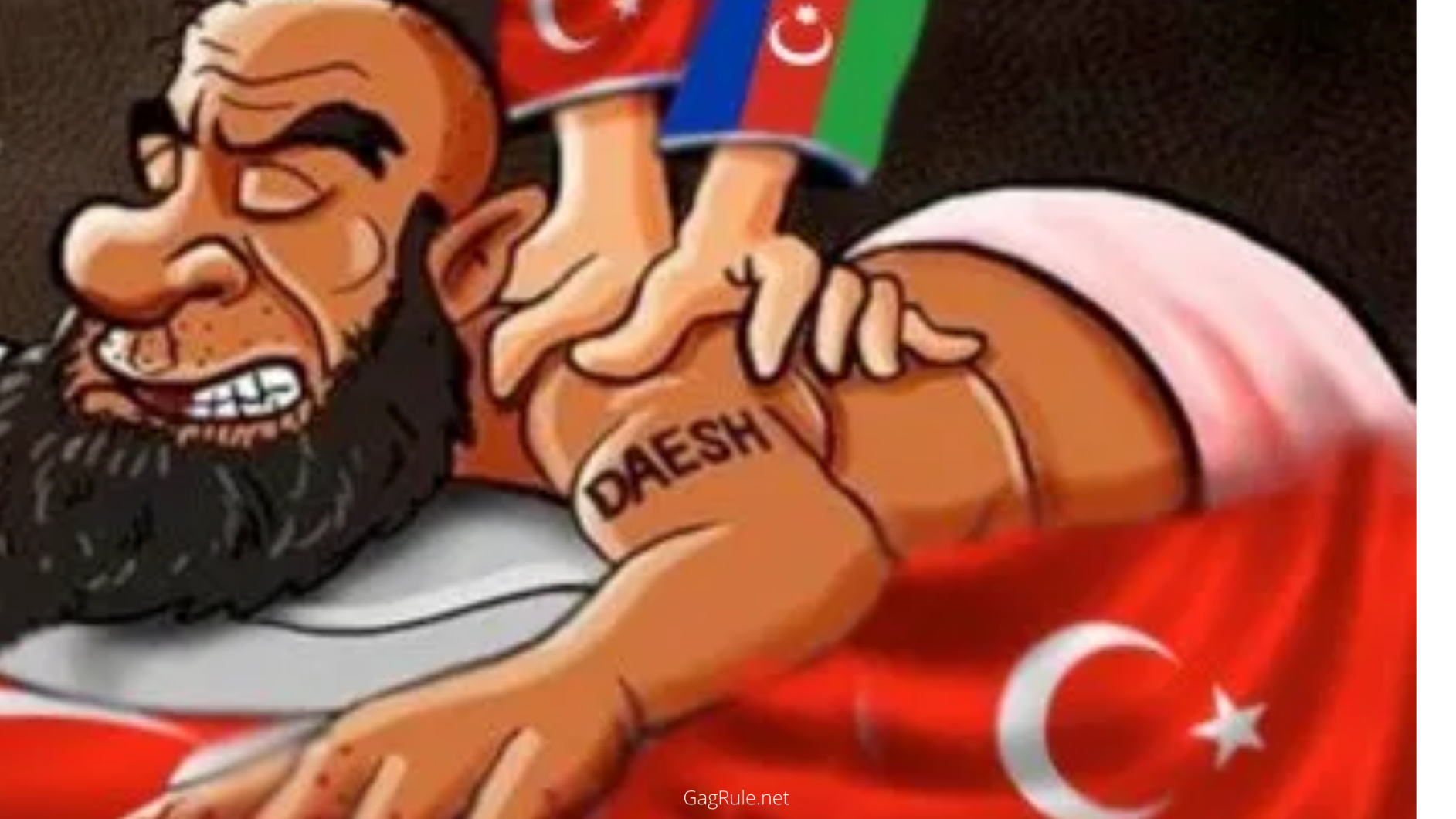
There is now abundant evidence that Azerbaijan is using Syrian jihadist mercenaries transported by Turkey from the areas it controls in Syria to fight against Armenians in Artsakh.
The question is why Azerbaijan, a majority-Muslim but ostensibly secular country run by dictator Ilham Aliyev on shaky footing, would want to have jihadists in his country. The question is all the more befuddling when considering that Azerbaijan has spent billions on its military over the past decade, achieving superiority in the quantity of armaments over Armenia and, also, in the size of their standing army: over 365,000 soldiers with active duty and reserve troops.
So, why mercenaries?
The answer lies in the fact that despite the decade-long propaganda that portrays Azerbaijan as a phoenix newly infused with strength and resolve due to a continuous stream of oil wealth, most citizens of Azerbaijan have little heart for a long war, especially for a place they have never been to and know little about; Aliyev’s dictatorial government knows this.
During the Artsakh Liberation War from 1988 to 1994, many Azerbaijanis were known to flee from the battlefield – a phenomenon seen during this war, as well – and return to their towns and villages to hide, requiring the leadership to recruit people by threat of force.
Additionally, it was well-documented that many of the fighters on the Azerbaijani side were from among the country’s minority groups – Lezgins, Talysh, and Meskheti Turks – along with Soviet Ukrainian soldiers, recently unemployed, who were hired as mercenaries, mostly to round out the Azerbaijani air force.
The experience with Islamic jihadists is also not new. In the first war, Chechen rebels led by the infamous Shamil Basayev and Afghan mujaheddin, led by the infamous Khattab, fresh off their victory over Soviet forces, were paid to come and fight.
It was difficult to hide the losses that Azerbaijan was suffering in that first war amid the internal political discord and general disarray of the collapsing Soviet Union. Warring political factions were happy to exploit the military failures of their opponents to try to secure power.
However, by the April War of 2016, the first large-scale attack on Artsakh since the ceasefire was signed, Azerbaijan was a tightly-controlled dictatorship with a smooth propaganda operation and internal institutions to keep a lid on the flow of information. So, although the April War lasted only four days, an estimated 1,000 soldiers were killed. This was immediately covered up to prevent discord and to this day, Azerbaijan claims that only 31 of their soldiers died.
The fact is that Aliyev understands that the higher the death toll in a war his people do not want to fight, the greater the likelihood that there will be internal unrest. The solution to this problem is to hire mercenaries.
The main benefit of using the mercenaries is that when they die, they aren’t sent back to Azerbaijani towns where people will be able to guess the devastation that Azerbaijan is suffering on the battlefield. Naturally, this lowers the number of dead soldiers being returned to families in Azerbaijan.
So, despite the 365,000 Azerbaijani soldiers at its disposal (over twice the size of Artsakh’s civilian population), the government of the country chooses to hire cheap and, in their eyes, expendable Syrian jihadists whose deaths will soften the blow of realizing how many soldiers are dying in the war with Artsakh. Effectively, these mercenaries act as cannon fodder for battles with Armenians.
Aliyev, nevertheless, seems to understand he is playing with fire in the Land of Fire and can’t afford to bring too many of these jihadists to the country lest they spread radical Islam and destabilize his rule. Thus far, he has brought only a few thousand of these jihadists but the longer the war goes, the more soldiers will die and it will be increasingly difficult to cover up the losses of his own soldiers.
Whether Aliyev chooses to bring in more jihadists or to send more Azerbaijanis to their deaths, his choices are limited and untenable. It is only a matter of time before the people lose their heart, the jihadists start making inroads, or political enemies take advantage of the instability created by his decisions.
In Russia’s shadow war with the west, one intelligence agency keeps making headlines.
The GRU, or main intelligence directorate, of the Russian army, has been accused of spearheading several of Russia’s most notorious operations in recent years. They include the 2014 seizure of Crimea using undercover soldiers called “little green men”, the hacking theft of emails from the Democratic National Committee and Hillary Clinton, and even the planning of a failed coup in Montenegro.
A British security source told the Guardian on Monday that the nerve agent attack on the former double agent Sergei Skripal was also ordered by the intelligence agency. The British government is poised to submit an extradition request to Moscow for two Russians suspected of carrying out the Salisbury attack that left one person dead and three injured, including Skripal and his daughter.
One of the three main Russian intelligence agencies, less has been written about the GRU (now officially called the GU, or Main Directorate of the General Staff of the Russian Armed Forces) than its sister agencies, particularly the Soviet-era KGB or its modern successor the FSB, the spy agency once headed by Vladimir Putin.
Known for operating under a wartime mentality and a willingness to take risks, experts say the culture of the GRU has been influenced by its inclusion of Spetsnaz special forces and experience in war zones, including Syria and Ukraine.
 Some sources have linked GRU agents to the downing of Malaysian airlines flight MH17. Photograph: Antonio Bronic/Reuters
Some sources have linked GRU agents to the downing of Malaysian airlines flight MH17. Photograph: Antonio Bronic/Reuters
Open source researchers have claimed that a GRU officer supervised the transport of anti-aircraft weapons to eastern Ukraine when the Malaysian jetliner flight MH17 was shot down there, killing 298 people.
“The GRU regards itself as a war-fighting instrument. Yes, it gathers conventional intelligence … but its culture is much more military,” said Mark Galeotti, an expert on Russian security issues and the country’s intelligence agencies. “Although only a minority of GRU officers are Spetsnaz, it has an impact when part of your service are commandos.”
Besides special forces, the spy agency manages more traditional intelligence-gathering operations around the world, as well as signals intelligence.
Vladimir Rezun, a GRU officer who defected to the UK in the 1970s, wrote in his history of the agency (written under the pen name Viktor Suvorov) that it was largely tasked with preventing the collapse of the Soviet Union from without, as opposed to the KGB, which had a prominent role in thwarting internal threats.
While the KGB became notorious, the GRU largely operated in obscurity. “In the people’s consciousness, everything that is dark, underground and secret is connected with the KGB but not at all with the GRU,” he wrote.
Traditionally, Galeotti noted, the GRU answered for “uncontrolled spaces”. While in the past that has meant areas like civil wars, it may also apply to zones like cyberspace now.
 US special counsel Robert Mueller recently linked the GRU to meddling in the 2016 US presidential election. Photograph: J Scott Applewhite/AP
US special counsel Robert Mueller recently linked the GRU to meddling in the 2016 US presidential election. Photograph: J Scott Applewhite/AP
Several Russian intelligence agencies were involved in hacking operations before the 2016 US presidential elections, but only the GRU was identified in an 11-count indictment released last month by the United States special counsel Robert Mueller’s investigation. The hack was perpetrated by staff employees of several Moscow-based units traditionally tied to signal intelligence.
The interests of Russia’s intelligence agencies regularly overlap, as have their methods. As Christopher Andrew wrote in The Mitrokhin Archive: The KGB in Europe and the West, his study of notes on KGB files smuggled out of Russia, the agency “offered its allies lethal nerve toxins and poisons which were fatal on contact with the skin for use during ‘special actions’”.
While the GRU has largely been shrouded in secrecy, there have been occasional contacts with the west.
Peter Zwack, a retired US army brigadier general, wrote about a series of meetings before the Sochi Olympics with the head of the GRU, Igor Sergun, who died unexpectedly of a heart attack in January 2016. “I found him soft-spoken, unassuming, complex, erudite and nuanced,” he said of their meetings, which largely focused on counter-terrorism efforts.
“I learned that even as Sergun relentlessly directed global intelligence operations against our interests, he — paradoxically — also viewed constant confrontation with the US and west as not in Russia’s best long-term interest,” Zwack wrote.
Those meetings ended after Russia’s invasion of Ukraine.
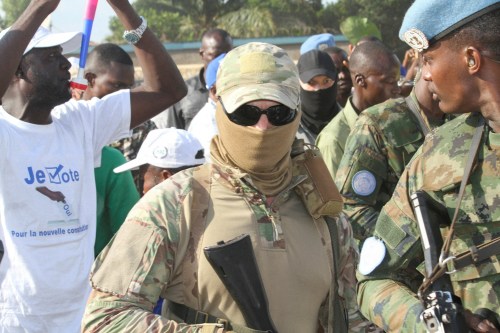
Predictions of the end of the Wagner Group’s operations in Africa and the Middle East in the aftermath of its ill-fated rebellion in Russia are premature. More likely, Wagner’s Middle East and Africa operations will persist: They still serve multiple interests of the Russian state and can be separated from Wagner’s Ukraine and Russia operations. Already, Russian Foreign Minister Sergei Lavrov has stated that Wagner’s operations in Africa will continue. But Wagner’s operations in Africa are likely to endure under a new leadership and structure.
Wagner’s footprint and Russian interests
Ukraine aside, the Wagner Group has sent mercenary deployments to Syria, Libya, Mozambique, Mali, the Central African Republic, and Sudan. Unconfirmed rumors have been swirling about Wagner’s presence in the Democratic Republic of the Congo. Wagner also maintains logistical, support, smuggling, and money laundering affiliates and subsidiaries in the United Arab Emirates. Through a vast network of intermediaries and shell companies, its business, commodity-extraction, and disinformation operations span even more countries.
There are several reasons why Wagner’s operations outside of Ukraine and Russia are unlikely to be liquidated even as the fate of Wagner’s disgraced boss, Yevgeny Prigozhin, remains far from resolved:
First, Wagner-Ukraine operations have been substantially separate from its Africa and Middle East operations. Early in the spring of 2022, the Wagner Group withdrew some of its forces from Syria and Libya and deployed them to Ukraine. But since the summer of 2022, Wagner has not significantly reduced its personnel or equipment in Africa or the Middle East.
Second, Wagner’s operations in Africa remain highly valuable for Russia, which uses them for extending its strategic influence and access to important raw commodities. The Wagner Group’s protection of gas and oil fields in Syria, on behalf of the Bashar al-Assad regime, for example, plays into Russia’s global energy coercion games. At least four Russian companies linked to Wagner have exploration permits for Syrian gas and oil fields.
Moreover, Wagner’s business schemes also establish smuggling networks that bring liquidity to the sanctioned Russian regime, such as through gold and diamond smuggling. The intensifying U.S. sanctions on Wagner in Africa and the Middle East have hampered Wagner’s operations but have not eviscerated them, especially as Wagner has long been involved in various clandestine and illegal economies as well, such as antiquities smuggling.
Third, there have been prior instances of the reshuffling of Russian private security companies in the Middle East when they fell afoul of various Russian intelligence services. In 2013, a Russian private security company, the Slavonic Corps, led by Dmitry Utkin, the notorious former Russian special operations forces officer, was sent to Syria to fight ISIS on behalf of the Assad regime. Yet in an inglorious retreat, they were not only chased out of Syria but also arrested in Moscow. Still, Utkin and various commanders and members of the Slavonic Corps were later allowed to form cadres under the Wagner Group. (Utkin, who hasn’t been heard from for several weeks, is now likely a prime target of the Kremlin’s ire.)
The Wagner Group has found itself frequently at odds with either the Russian Federal Security Service, known by its abbreviation FSB, or the Russian military during its deployment to Syria. Those long-running tensions reached a peak in 2018 when, despite the establishment of deconfliction mechanisms between the Russian and U.S. militaries, the United States bombed Wagner’s deployments, killing scores. Prigozhin, Utkin, and the Wagner Group blamed the Russian military for throwing them under the bus on purpose.
Yet however much the Russian military and intelligence services already wanted to cut Wagner to size, the Kremlin had no desire to remove its useful tool of influence.
Furthermore, both the FSB and the GRU, the Russian military intelligence agency, have had complex linkages and influence over Wagner’s overseas operations. Like the Kremlin, they also make money from Wagner’s business operations, whether these operations feed their pockets or parts of their institutional budgets. Prigozhin has used money from Russian state contracts, amounting to some $20 billion, to fund his mercenary, media, and business ventures abroad. The interconnected management of state funding and Prigozhin’s (semi-)private ventures also implies highly interconnected interests for a wide array of influential regime actors. Thus, like in Russia, some of Wagner’s businesses may be shut down, but others will be merely reshuffled. But neither the Kremlin nor the intelligence services want to lose the Wagner income and tool, even if they want to control it better.
Restructuring, not liquidation
Rather than fully liquidating Wagner in Africa and the Middle East, Russian intelligence services will purge Wagner’s structures to weaken affinities to Prigozhin and strengthen ties to the Kremlin. Such a restructuring would mimic the seeming preference of Russian President Vladimir Putin with respect to Wagner in Russia and Ukraine — rolling some cadres under the Russian military, disarming others, and allowing others yet to operate in the existing semi-independent format, but under a new leadership and with Prigozhin’s power minimized.
Such restructuring has started in Syria where Russian forces, assisted by the Assad regime, surrounded Wagner bases and interrogated and removed some Wagner operatives. That the Kremlin would prioritize reasserting control of Wagner in Syria is not surprising: That’s where Gen. Sergey Surovikin, who is close to Prigozhin and hasn’t been seen since the rebellion, led Russia’s brutal and indiscriminate air campaign on behalf of the Assad regime and had close connections with Wagner forces. Wagner’s forces in Syria could most augment the Wagner threat to the Kremlin. But it is noteworthy that the Assad regime did not hesitate in supporting the Russian state against Wagner.
Beyond purges, the Wagner Group in Africa may be renamed and broken up into multiple separate entities. Chopping up Wagner this way would give the Russian state better control over the proxy, even as the network’s murkiness would persist, and rival Kremlin and Russian intelligence and security services could clash with one another in mercenary and business ventures.
Under better control, Russia will likely tolerate and retain Russian private security companies operating abroad. Unlike in Syria, where the Russian military has had an official presence since 2017, sending official “military advisors” to African countries, instead of private proxies, poses various legal and diplomatic inconveniences for Russia and the African countries.
In Ukraine, since December 2022, far before Wagner’s June rebellion, the Russian military has had strong incentives to transfer Wagner forces to the control of the Russian military — to tighten command, eliminate an independent force, and neutralize an increasingly unrestrained and troublesome Prigozhin. Abroad, the Russian state wants tighter control over Wagner operations too, but without the official state label.
Buyer beware: No easy way out
Nor do the African and Middle Eastern countries that have signed up with Wagner have an easy capacity to fire it. Mali is a prime example. After succumbing to Russia and Wagner’s influence and having kicked the French military out of the country in 2022 and the U.N. peacekeeping mission in June 2023, Mali is dependent more than ever on Wagner’s forces. All the more so that the U.N. Security Council accepted Mali’s request and voted to end the mission.
Focused far more on securing access to Mali’s gold mines, the 1,000-2,000 Wagner contractors have not been particularly effective in suppressing the jihadis in Mali’s north. In fact, from counterinsurgency and counterterrorism perspectives, their brutality has backfired. But the junta has no immediate alternative.
Besides, Wagner’s principal sell in Africa has become its praetorian guard service for authoritarian regimes as well as elected governments — like in the Central African Republic (CAR). There, Wagner provides security to the president and trains the country’s army. Besides making money from mining, timber extraction, and a beer company, Wagner advisors have developed vast influence over the CAR state, furthering Wagner and Russian interests at the expense of the public good.
Similarly, in the context of ongoing intense fighting in Sudan, Gen. Mohamed Hamdan “Hemedti” Dagalo, the head of the Rapid Support Forces, a key opposition group, is unlikely to forgo Wagner’s intelligence and other support. The support may be limited in terms of weapons and ammunition, but it would still be costly for Hemedti to give it up.
Wagner’s rebellion in Russia likely shook the confidence of African regimes that the Wagner Group is a reliable partner. Yet even an African government as dependent and almost subservient to Wagner as that of the CAR has sided with Russia, not Wagner, in the rebellion’s fallout.
But Wagner’s revolt also showed its daring confidence in mounting an uprising as well as its linkages to various poles of power in the Russian military and intelligence services. Even as these connections are purged and reconfigured within Russia, Africa, and the Middle East, they can still be useful for African governments as they try to play Russia against the West and actors within Russia against each other.
Nonetheless, various African delegations heading to St. Petersburg at the end of July for the Russia-Africa Summit will likely have questions about the future of Wagner’s Africa operations and the extent of Russia’s backing, even as strengthening economic relations is the official billing of the conference.

JERUSALEM, Oct 9 (Reuters) – Israeli Prime Minister Benjamin Netanyahu on Monday said atrocities committed by Hamas during its attack on Israel mirrored those carried out by the jihadist group Islamic State.
Netanyahu in broadcast remarks recounted how some Israelis were killed during the Hamas incursion, saying tied-up children were executed. This, he said, was on par with brutal killings carried out by Islamic State, also known as ISIS.
“The atrocities committed by Hamas have not been seen since ISIS atrocities. Bound children executed along with their families. Young men and women shot in the back, executed. Other horrors I won’t describe here,” Netanyahu said.
“We have always known who Hamas is. Now the entire world knows. Hamas is ISIS. And we will defeat it just like the enlightened world defeated ISIS. This vile enemy wanted war and it will get war,” he said. (Reporting by Ari Rabinovitch and Maayan Lubell; Editing by Mark Porter)
Our Standards: The Thomson Reuters Trust Principles.

Israeli Prime Minister Benjamin Netanyahu likened Hamas to ISIS in a fiery speech Monday night, in which he vowed that the Jewish nation’s retaliation against the terrorist organization for the killing and kidnapping of civilians “will reverberate with them for generations.”
“We have only started striking Hamas,” the 73-year-old world leader said in televised remarks, as rockets continued to rain down on the Gaza Strip.
He claimed that Israel is in a fight “for our home, a war to ensure our existence — a war that we will win.
“What we will do to our enemies in the coming days will reverberate with them for generations,” Netanyahu continued, before going on to speak about the horrors Israeli citizens have had to face over the past four days.
“The atrocities carried out by Hamas have not been seen since the atrocities of ISIS — children bound and executed with the rest of their families, young girls and boys shot in the back, executed, and other atrocities that I will not describe here,” he said.
“Hamas terrorists bound, burned, and executed children. They are savages,” Netanyahu declared. “Hamas is ISIS.
Israeli Prime Minister Benjamin Netanyahu compared Hamas to ISIS in a televised speech Monday night.@IsraeliPM / X
“We have always known who Hamas is,” he continued, speaking of the Israeli people. “Now, the entire world knows who Hamas is, and we will defeat it just like the enlightened world defeated ISIS.”
Netanyahu concluded by saying: “This vile enemy wanted war, and it will get war.”
The Israeli prime minister also reportedly told US President Biden the country has no choice but to unleash an all-out ground operation in Gaza.
“We have to go in. We can’t negotiate now,” Netanyahu told Biden, according to three unidentified sources familiar with the conversation who spoke about it with Axios.
He said Israel had to respond to the atrocities committed by Hamas with force because a country can’t show weakness in the Middle East.
Netanyahu reportedly told US President Biden Israel has no choice but to unleash an all-out ground operation in Gaza.REUTERS Netanyahu’s speech came as rockets continued to rain down on Gaza.REUTERS
“We need to restore deterrence,” Netanyahu reportedly told the US president, who decided not to try to convince him to escalate to a ground operation, the sources said.
As of Tuesday, the four-day war has already claimed at least 1,600 lives, as Israel saw gun battles in the streets and neighborhoods in Gaza reduced to rubble.
Hamas had also abducted up to 150 civilians, including women and children, who were forcibly taken from their homes.
As of Tuesday, the four-day war has already claimed at least 1,600 lives.REUTERS
It warned on Monday that it would start executing those hostages.
“Every targeting of our people without warning will be met with the execution of the civilian hostages,” the terrorist organization’s Ezzedine al-Qassam Brigades said in a statement.
Just a few hours later, Abu Obaida — the brigades’ spokesperson — told Al Jazeera: “We have decided to put an end to this, and as of now, we declare that any targeting of our people in their homes without prior warning will be regrettably faced with the execution of civilians we are holding.”
The exact number of hostages being held by Hamas is not known, but on Tuesday the Israel Defense Forces announced it notified 50 families whose loved ones are being held hostage in the Gaza Strip.
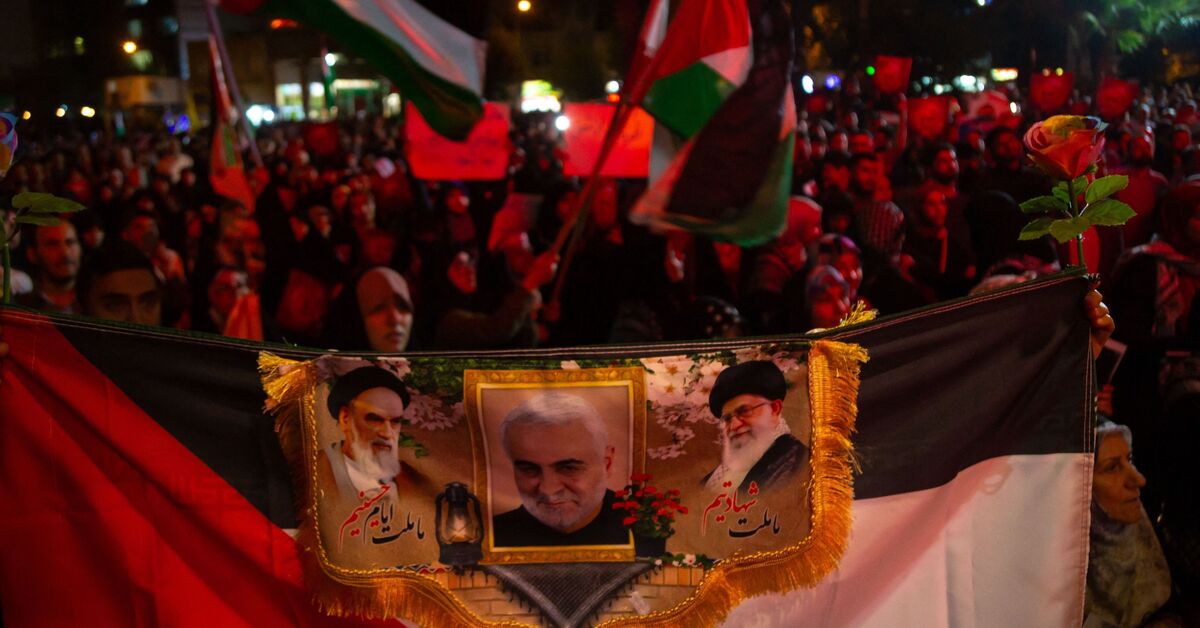
TEHRAN — Iran’s Supreme Leader Ayatollah Ali Khamenei threw generous praise at the militant Palestinian movement Hamas for a wave of deadly attacks and hostage taking well inside Israel over the weekend, that has left so far more than 1,000 Israelis dead.
Addressing cadets at a Tehran military academy on Tuesday, Khamenei hailed Hamas for the “epic” victory and the “destructive earthquake” it inflicted upon Israel.
“We do kiss the foreheads and the arms of the smart masterminds and the Palestinian youths,” the Iranian leader said as reported by his official website.
Khamenei maintained that for years to come, Israel will have to reel from the “irreparable” devastation it was dealt by the Palestinians militants. Using his signature rhetoric against Iran’s arch-foe, Khamenei described Israel as a “usurper” and a “tyrannical,” “ignorant” and “monstrous” entity.
The Iranian leader, who holds the final say in the country’s foreign policy and military affairs, warned that an even “bigger calamity” awaits Israel should it continue “committing crimes” against the Palestinians.
Yet the 84-year-old cleric denied his country’s involvement. “The supporters of the [Israeli] regime and the regime itself have in the past few days kept saying nonsense, including that the Islamic Republic was behind the move,” he said. “They are miscalculating,” he added, reasserting, “Of course, we do defend Palestine and its struggle.”
Khamenei was responding to arguments from Israeli officials and Western media reports that Iran was directly involved in the attacks or at last gave the green light to the Palestinian militants, whom it has been funding and arming for much of the past four decades. Hamas officials have made contradictory comments as to whether they were backed by Tehran in the attacks.
Earlier on Monday, the United States warned the Islamic Republic and its main proxy in Lebanon, Hezbollah, to stay out of the ongoing conflict. And amid speculation that Iran could be targeted if the conflict escalates and spreads, Iran’s Foreign Ministry spokesperson Nasser Kanaani declared on Monday that Tehran’s response to any “stupid” move will be devastating.
The lightning operation that caught the world by surprise occurred four days after Khamenei openly expressed his unease with normalization efforts between the Arab world and Israel. The last Arab state to have expressed such willingness was Saudi Arabia, which without naming, Khamenei advised that such rapprochement would be “betting on the losing horse.”
As prospects of further Arab-Israeli reconciliation appeared complicated amid the escalating conflict, the deputy speaker of the Iranian Parliament, Mojtaba Zolnouri, expressed hope that following the Hamas attacks, “the issue of recognizing Israel by the regional countries will be shelved forever.”
From the early hours into the Hamas operation, Iran’s state media organs have been applauding the “glorious triumph,” extensively publishing footage of Israelis being kidnapped and dragged away. To them, the attacks exposed Israel’s vulnerabilities and shattered the Jewish state’s “myth of invincibility,” as they saw the beginning of the end of Israel and “the moment of truth” promised by Khamenei.
In the latest, the official X (Twitter) account of the Iran newspaper — the leading media platform of the government in Tehran — drew strong criticism among many Iranians after posting a controversial cartoon.
The design featured what appeared to be a Palestinian youth posing with the victory sign while holding a balloon that read “1K,” presumably a reference to the mounting casualties on the Israeli side.
“We just hit the 1,000 mark,” the paper read.
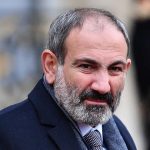
Armenia is ready to hold a meeting in the “3+3” format (Azerbaijan, Armenia, Iran, Russia, Georgia, and Türkiye), Armenia’s Prime Minister Nikol Pashinyan said in an interview with the Public TV Channel, Report informs via News.am.


